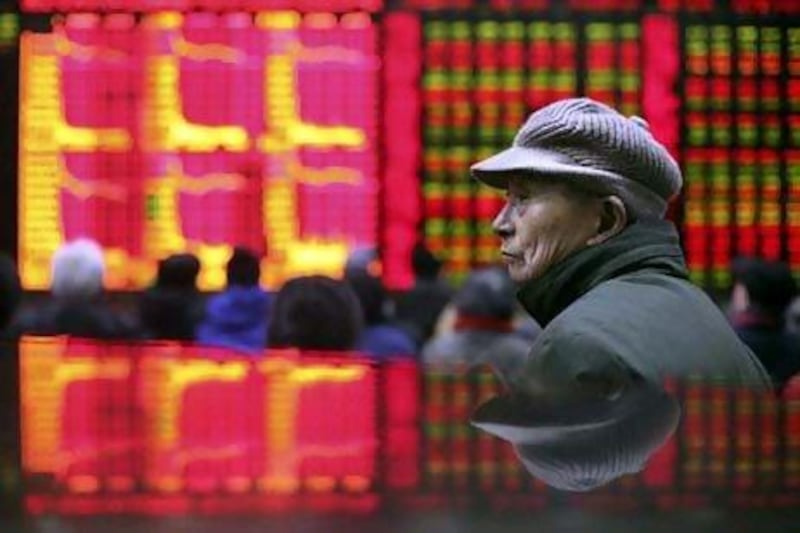It is a Monday morning at China Galaxy Securities in east Beijing and an assistant is talking through stock prices at a trading terminal with a middle-aged male customer.
One graph shows a share price falling inexorably, while another shows a stock that looks more promising, with a steady rise apparent despite fluctuations.
Prices are displayed on elevated screens, but there are few customers to look at them and, in any case, the figures are too small to be read by anyone more than a couple of metres away.
Clearly this branch is not designed for customers who want to spend a morning monitoring the markets from the comfort of a chair.
This is unsurprising, given that more than four fifths of stock trades in China are carried out online, with many investors playing the stock market from home.
"We used to have big screens, but now at nearly all the branches, we don't have many buyers coming here to the office. They only buy and sell and do research using the internet," says a staff member with the surname Yan.
Individuals who buy and sell stocks - they are known as retail investors - drive activity on the Shanghai and Shenzhen bourses.
"In China, the stock market is dominated by the people, not institutional investors," says Zhang Fan, a strategy analyst at Tebon Securities in Shanghai.
China has about 140 million securities trading accounts, and institutions hold less than a 20 per cent market share, half the figure in developed stock markets.
Yet this brings with it problems, especially given the erratic behaviour of individual investors in China, and it proves that despite their size, the country's stock exchanges are still in an early stage of development.
The Shanghai Stock Exchange, which traces its roots back to the late 19th century but was restarted only in 1990, ranks fifth worldwide in market capitalisation, one place above the Hong Kong market, with Shenzhen, dating from 1990, in 12th.
Few investors try to develop a balanced portfolio of stocks that will appreciate over time and offer security in retirement.
"Rather than selecting funds to meet diverse investment needs, Chinese investors seem to approach buying funds with a betting mentality," said a 2010 report - Chinese Securities Markets' Current Status and Future Outlook - published by Nomura Research.
Indeed, one Shanghai analyst, who asked not to be named, says that in China "people like gambling", an activity that is officially outlawed.
"People want to become rich overnight by doing the investing, by gambling on the stock market or gambling in the casino or on property," he says.
This, he points out, causes wider fluctuations in the value of the indexes. When prices rise, investors sell quickly rather than holding on to secure long-term growth. That in turn discourages investors from staying in for the long haul.
Nicholas Lardy, a senior fellow at the Peterson Institute for International Economics, a Washington think tank, and the author of Sustaining China's Economic Growth after the Global Financial Crisis, believes many investors in the country put their money in property because they lack faith in stocks. Problems such as insider trading compound the issues created by investor behaviour.
The likes of the China Securities Regulatory Commission, which covers Shenzhen and Shanghai, are trying to improve the situation, but analysts say it is a tough job. This month, regulators expressed concern that speculation on new stocks was forcing prices up on the equities' first trading day, only for them to fall later.
To combat speculation, Shenzhen Stock Exchange this month suspended trading on two companies after more than 50 per cent of shares were sold. Yet the Shanghai analyst expresses doubts about the effectiveness of such measures.
"Shanghai and Shenzhen Stock Exchanges, they have made many restrictions and regulations to control or restrict such speculation, but so far these regulations have very limited effects on handling such speculation," he says.
Another source of instability is the structure of China's stock markets, with many relatively low-value companies listed but only a few large household names are listed.
In fact, many of China's leading companies do not list on the mainland. Shares in China Mobile, for example, are traded in Hong Kong and New York only. Shenzhen, in particular, tends to list smaller companies, many of them exporters.
"If you list the company in Hong Kong or overseas, maybe it's [partly] a marketing tool, a quality signal to raise their global viability," says Ju Nengjiu, a visiting associate professor of finance at Shanghai Jiao Tong University.
There have, however, been headline-grabbing initial public offerings on the Chinese mainland.
In mid-2010, the Agricultural Bank of China broke records with an IPO valued at US$22.1 billion (Dh81.17bn). Nearly half was raised in Shanghai, the rest coming from shares listed on the Hong Kong Stock Exchange. Such was the demand that the IPO was 10 times oversubscribed.
Yet others note that once the big banks are taken out, the bourses' track record at generating capital through IPOs is poor.
"It's not really proving a method for financing new businesses in the way it might," says Mr Lardy.
While turnover levels have declined, mirroring the situation in more-developed markets, Mr Lardy believes that not enough shares of the listed state-controlled enterprises are traded.
On the plus side, Mr Ju is convinced that as time goes on, investors "will become more educated, more sophisticated" and speculative behaviour will become less common.
He also says pension funds are likely to become more significant investors in the Chinese markets as the middle class recognises the need to save for retirement.
Looking for long-term growth and strengthened by government measures aimed at promoting private pensions, the middle class will also be a force for stability.
"As the financial market develops and regulations and rules improve, these will be much, much larger markets," says Mr Ju.






